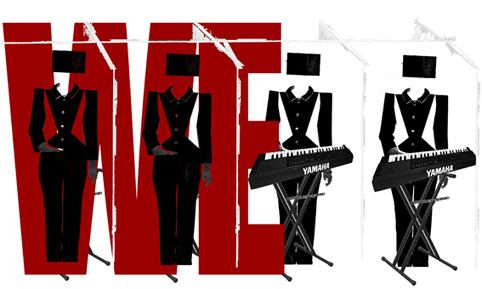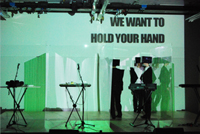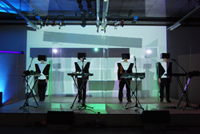
Available on 10" vinyl for £7.99 (contact us for shipping outside the UK)
WE is the ghost of the future of the left. To perform political speech, you have to say WE and we all know this WE will exist as a result of what I have said now. - Slavoj Zizek
It is Marx who, for ‘general intellect’, uses the term ‘social individual’. We can postulate that the general is something pre-individual, a kind of general consciousness that exists before individuals form, and from which they form. This general pre-individual is a WE that exists before the different I’s develop, so is not the sum of all I’s. - Paolo Virno
The individual can be sacrificed to a historical cause that exceeds him. [...] It is only by dissolving itself into a project that exceeds him [that a subjective reality can be created]. The WE constructed in and by this project is the only thing that is truly real—subjectively real for the individual who supports it. The individual, truth be told, is nothing. The subject is the new man, emerging at the point of self-lack. The individual is thus, in its very essence, the nothing that must be dissolved into a WE-subject. - Alain Badiou
WE is a live performance, video and vinyl project by Pil and Galia Kollectiv, featuring Victor M. Jakeman and Ruth Angel Edwards. Challenging the individualism of the Wes
tern pop song, WE reveals the latent politics of the love song and transforms chart hits by annihilating their liberal subject and replacing it with a collective consciousness. Through the simple substitution of the plural for the singular, intimacy becomes a form of collective action and the unique the universal. Despite being the mass product of an anonymous culture industry, the very premise of the pop song is one of extreme individualism, elevating the ‘one’ subject of romantic desire above any other and declaring one moment in time more significant (‘when I first saw you’) than any other.
As a result, even though the pop song is often the outcome of the labour of producers, engineers and technicians, it is associated with the strong fictional character of the pop star. WE reinjects collectivity into this framework, exploring the tension between the dystopian quality of the totalitarian mass and the utopian promise of a communal project. Inspired by the dystopian fiction of Yevgeny Zamyatin and the minimal synth covers of pop classics made by obscure DiY groups in the late 1970s and early 1980s, WE follows in the footsteps of bands like The Better Beatles, who sought to improve on the canon of popular music by stripping it bare, even.



